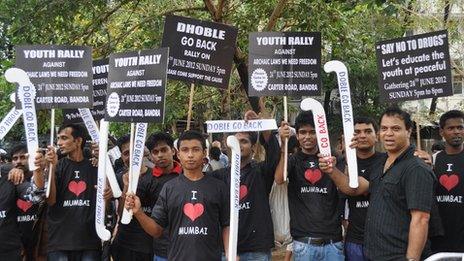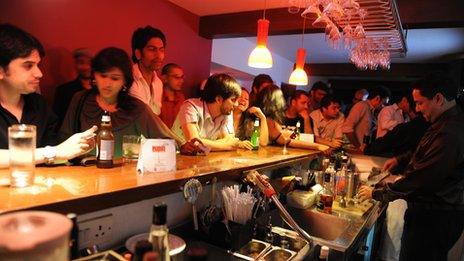Police crackdown on Mumbai bars
- Published

Hundreds of people turned out in Mumbai last weekend to protest against a series of police raids on bars and clubs. Many believe it's a concerted attempt by authorities to restrict dancing and drinking in India's most cosmopolitan city.
In a break from the monsoon rains, a group has gathered by the seafront in one of Mumbai's hippest areas.
"We want to be free, free. We want to be free Mumbai," they sing.
Many of them are wearing black, to mourn what they say is the death of nightlife in the city.
Others are holding hockey sticks, which say "Dhoble go back", a reference to police commissioner Vasant Dhoble, who is known for carrying a hockey stick on raids.
"We work hard, we want to play hard, and there's nothing wrong with that. The right for us to go out and have a little bit of fun is being taken away from us," says 29-year-old Elita Sequeira, who enjoys relaxing with friends over a glass of wine or whisky.
"They're trying to stop us from having a good time, we play music, but we've had to cancel many of our shows because everything is shutting down early now," says Aditya, one of the many DJs who has joined the protest march.
Mumbai is India's entertainment and financial capital and has long been seen as a progressive part of the country, where liberal values and lifestyles are accepted.
On any night of the week there are dozens of parties taking place in the city, from rooftop cocktail soirees to dance parties at trendy nightclubs, gigs at pubs and opulent pool parties.
But in recent weeks, police in the city have raided a number of bars and clubs, shutting them down or fining them for being overcrowded or failing to comply with the many licences needed to run a venue.
The police say they're simply upholding laws on drinking and entertainment, but critics say the regulations, many of which date back to the 1950s and 1960s, are archaic and out of step with modern India.
More than 30,000 Indians have signed up to <link> <caption>online protest groups against the recent crackdown</caption> <altText>Facebook group</altText> <url href="http://www.facebook.com/groups/dhobs/" platform="highweb"/> </link> , with much of the anger focused on Dhoble.
"Dhoble came in with video cameras and started filming the crowds, before telling me that my club was too overcrowded," says the owner of one Mumbai nightclub who did not want to be named.
"They told us we could only have 10 couples in our club, which is 2,000 square feet, and told us to shut the music down, even though we have a discotheque licence," he added.
A number of other bar owners have told the BBC they too have had a visit from Dhoble, and been made to pay fines.
The Bombay Police Act of 1952 requires any establishment with more than 166 people in a space of 1,000 square feet to pay a penalty, but owners say they are being penalised even when they are not flouting the law.
Just to operate, bar owners need to apply for as many as three dozen different permits including liquor licences, dancing licences, licences to play music and public performance licences, which one bar owner described as "complicated, time consuming and expensive".

Drinking is permitted to those over the age of 25 in Mumbai, but the Bombay Prohibition Act of 1952 requires people to be issued with paper permits, should they wish to consume or carry alcohol at home or in a bar, a law increasingly being enforced.
"There is a sense of unusual fear in Mumbai at the moment, everyone is scared to go out, even to a house party," says Sameer Malhotra, a music promoter who organises events and parties in the city.
Malhotra believes the police are targeting a certain section of the city - upwardly mobile young Indians whom they want to make an example of.
"There are 24-hour party places all over the world but if we're planning to step into the 21st Century with our head held high and want the rest of the world to come into this country we have to have better facilities," says Malholtra who believes the laws are putting off foreign visitors and business to the city.
It is not just young partygoers who have been the target of raids.
Last week, 55-year-old Priti Chandriani had her home raided for making and possessing chocolate liqueurs, without a valid permit.
In one case, a curry house in the city was raided and a number of women were arrested, over claims they were prostitutes. Nine of the 11 women have since been released, and say they were simply at a birthday party.
But the police have defended their actions. A raid at another party, which was attended by celebrities and sports players, attracted media attention but police say that as many as 44 of the 100 or so who were detained, tested positive for drugs.
While Dhoble's actions have been widely criticised, the man himself says he is simply upholding the law.
"We were not conducting raids, we were just ensuring that rules and regulations are implemented. We aren't curbing the night life, let the people enjoy. We are just implementing the law," he told Indian television channel NDTV.
The BBC contacted Dhoble but he refused to comment on the raids, saying only that he was an "ordinary policeman".
There are others who support his actions, saying he is preserving Indian culture.
"He is non-corrupt and honest. Today's youth just want fun and enjoyment with girls and vice-versa," wrote one poster on one of the <link> <caption>pro-Dhoble groups on Facebook</caption> <altText>Facebook group</altText> <url href="http://www.facebook.com/groups/380267578698111/" platform="highweb"/> </link> .
"We fully support him for his action against wild nightlife of the elite class in Mumbai," wrote another.
Dhoble has the backing of the city's police chief Arup Patnaik and the Maharashtra state government, which has promised to "relook" at the laws upon which he is acting.
"We can assure people that actions against innocent people will not be happening," the state's home minister, Satej Patil, told the BBC.
"Mumbai is an internationally renowned city, and certain things will be looked at considering the image of Mumbai being a cosmopolitan city which is awake 24 hours.
"But we don't want a stigma on Mumbai that rave parties are conducted here. The law will take its own action regarding such illegal activity," he added.
But, typifying India's struggle between old and new, partygoers in the city say they'll continue to fight to get the decades-old regulations changed.